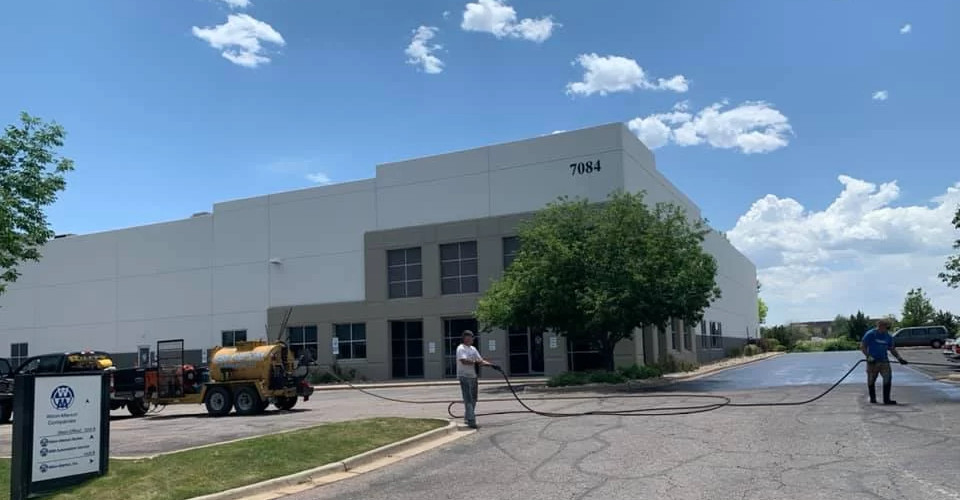
When paving a parking lot, asphalt is a great choice because it’s strong and affordable. But you might be wondering, “How long does asphalt last?” The life expectancy of asphalt pavement depends on a few key things:
• The weather in your area
• How much traffic and use it gets
• How well you maintain your asphalt
Understanding these factors and the stages of an asphalt surface’s life can help you make smart choices about protecting commercial asphalt and keeping it in great shape for years to come.
• Weather: Very hot or cold temperatures can make asphalt expand, contract, and crack. The freeze-thaw cycle in colder places can be really hard on asphalt, making it more susceptible to damage.
• Use: The amount and type of traffic your asphalt gets makes a big difference in how long it lasts. Heavy traffic, especially from big vehicles like trucks and buses, puts more stress on the pavement and can cause it to wear down prematurely.
• Not much maintenance needed
• Fix any small cracks or damage right away
• Repaint parking space lines as needed
• Sealcoat every few years to protect against the weather
In the first five years, a well-built asphalt parking lot or driveway should stay in great shape with little maintenance and upkeep. But it’s important to fix any small cracks or damage quickly so they don’t get worse. You’ll want to repaint the parking space lines to keep them clear. Putting on a sealcoat every few years helps protect the asphalt from the weather and makes it last longer.
• More likely to get damaged from traffic, weather, and sun
• Filling cracks and sealcoating become very important
• Watch for signs of bigger problems, like alligator cracking or drainage issues
As the parking lot gets older, it’s more likely to get damaged from traffic, weather, and sun. During this stage, you might see more cracks and small potholes. Regularly filling cracks and sealcoating becomes very important to stop water from getting in and causing more damage. Keep an eye out for signs of more serious problems, like alligator cracking or drainage issues, which might need a professional to fix.
• Might need bigger repairs
• Fix larger cracks, potholes, and areas of damage
• Think about resurfacing or putting a new layer on top to make it last longer
• Stick to a regular maintenance and upkeep plan to avoid expensive repairs
In the later years of an asphalt surface’s life, it might need bigger repairs. Larger cracks and potholes can show up, needing patching or resurfacing. If you don’t fix these problems, they can weaken the structure of the pavement, leading to costly repairs or even needing to replace the whole thing. Resurfacing or putting a new layer of asphalt on top can help make it last longer. Staying on top of regular maintenance and upkeep is key to preventing pricey repairs and extending the lifespan of your asphalt.
• Check the overall condition of the parking lot
• Decide if repairs are still worth the cost or if it needs to be replaced
• Work with a paving contractor to plan for rebuilding or replacing
After 20 or more years, your asphalt surface may reach the end of its life. At this point, it’s important to look at the overall condition of the pavement and decide if repairs are still worth the money or if it needs to be completely replaced. High-quality asphalt pavement can last an average of 25 years with proper maintenance, but factors like heavy traffic, harsh weather, and poor drainage can shorten the life of your asphalt.
• Sealcoat every 3-5 years to protect against water, oil, and sun damage
• Fill cracks quickly to prevent water from getting in and causing more damage
• Make sure your parking lot or driveway has good drainage to avoid standing water and erosion
• Keep the surface clean and free of debris, oil stains, and other damaging things
• Avoid putting too much weight from heavy vehicles or equipment when you can
If you see big cracks, potholes, drainage problems, or other signs of serious damage, it’s time to call in a professional paving contractor like Riley Asphalt. Our team has years of experience working with asphalt and can:
• Carefully look at the condition of your parking lot or driveway
• Suggest the best thing to do (repair, resurface, or replace)
• Give expert advice on taking care of your asphalt and preventing future damage
Don’t wait until your asphalt has gotten too damaged to fix. Regular maintenance and fixing problems early can save you money in the long run and help keep your asphalt protected for years to come.
At Riley Asphalt, we understand the unique challenges of maintaining an asphalt surface in Colorado’s climate. Our skilled team is dedicated to helping you get the most life out of your pavement and protect your investment. Contact us today for a free estimate and learn more about our full range of asphalt paving, repair, and maintenance services. We’ll work with you to ensure that your new asphalt parking lot or driveway lasts as long as possible.
Please complete the form below for a free no-obligation estimate.